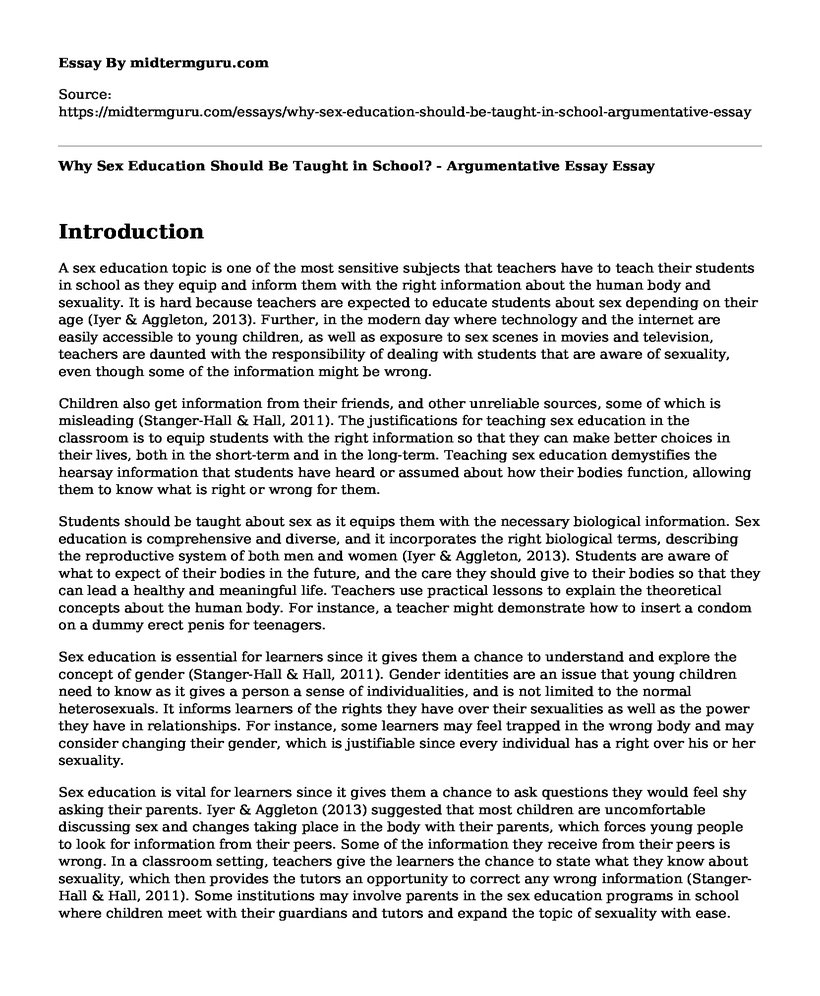Introduction
A sex education topic is one of the most sensitive subjects that teachers have to teach their students in school as they equip and inform them with the right information about the human body and sexuality. It is hard because teachers are expected to educate students about sex depending on their age (Iyer & Aggleton, 2013). Further, in the modern day where technology and the internet are easily accessible to young children, as well as exposure to sex scenes in movies and television, teachers are daunted with the responsibility of dealing with students that are aware of sexuality, even though some of the information might be wrong.
Children also get information from their friends, and other unreliable sources, some of which is misleading (Stanger-Hall & Hall, 2011). The justifications for teaching sex education in the classroom is to equip students with the right information so that they can make better choices in their lives, both in the short-term and in the long-term. Teaching sex education demystifies the hearsay information that students have heard or assumed about how their bodies function, allowing them to know what is right or wrong for them.
Students should be taught about sex as it equips them with the necessary biological information. Sex education is comprehensive and diverse, and it incorporates the right biological terms, describing the reproductive system of both men and women (Iyer & Aggleton, 2013). Students are aware of what to expect of their bodies in the future, and the care they should give to their bodies so that they can lead a healthy and meaningful life. Teachers use practical lessons to explain the theoretical concepts about the human body. For instance, a teacher might demonstrate how to insert a condom on a dummy erect penis for teenagers.
Sex education is essential for learners since it gives them a chance to understand and explore the concept of gender (Stanger-Hall & Hall, 2011). Gender identities are an issue that young children need to know as it gives a person a sense of individualities, and is not limited to the normal heterosexuals. It informs learners of the rights they have over their sexualities as well as the power they have in relationships. For instance, some learners may feel trapped in the wrong body and may consider changing their gender, which is justifiable since every individual has a right over his or her sexuality.
Sex education is vital for learners since it gives them a chance to ask questions they would feel shy asking their parents. Iyer & Aggleton (2013) suggested that most children are uncomfortable discussing sex and changes taking place in the body with their parents, which forces young people to look for information from their peers. Some of the information they receive from their peers is wrong. In a classroom setting, teachers give the learners the chance to state what they know about sexuality, which then provides the tutors an opportunity to correct any wrong information (Stanger-Hall & Hall, 2011). Some institutions may involve parents in the sex education programs in school where children meet with their guardians and tutors and expand the topic of sexuality with ease.
Conclusion
In conclusion, teaching sex education in school is essential. Learners are given information about their bodies, giving them a chance to make the right choices. Therefore, if learners choose to engage in sex at an early age, they can make the right decisions like using protection. Sex education informs learners about the dangers of engaging in unprotected sex with multiple partners. Telling the learners about their sexuality empowers them to choose what they desire.
References
Iyer, P., & Aggleton, P. (2013). 'Sex education should be taught, fine... but we make sure they control themselves': teachers' beliefs and attitudes towards young people's sexual and reproductive health in a Ugandan secondary school. Sex Education, 13(1), 40-53.
Stanger-Hall, K. F., & Hall, D. W. (2011). Abstinence-only education and teen pregnancy rates: why we need comprehensive sex education in the US. PloS one, 6(10), e24658.
Cite this page
Why Sex Education Should Be Taught in School? - Argumentative Essay. (2022, Oct 04). Retrieved from https://midtermguru.com/essays/why-sex-education-should-be-taught-in-school-argumentative-essay
If you are the original author of this essay and no longer wish to have it published on the midtermguru.com website, please click below to request its removal:
- The Birth of Literary Criticism - Literature Paper Sample
- Annotated Bibliography on Juvenile Delinquency and the Relation to Parenting Styles
- Assignment Example on Policy Issues for Elderly LGBT Individuals
- How to Navigate the Relationship - Essay Sample
- Essay Sample on LGBT Workplace Diversity
- Fostering Students' Literacy Skills: The Role of Teachers - Essay Sample
- Paper Example on LGBTQ in the Arab Cinema Industry







